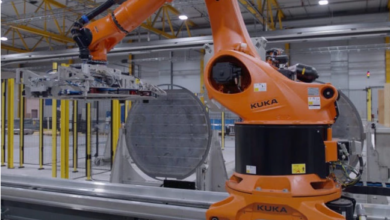Salzgitter Group invests in H2 SteeLab
Combining steel competencies for the hydrogen economy, particularly for steel tubes and pipes for the hydrogen infrastructure and mobility.

Salzgitter Mannesmann Forschung (SZMF) runs one of its research sites on the premises of Hüttenwerke Krupp Mannesmann in Duisburg-Huckingen.
Products and processes focused on the material of steel are developed and tested at this site. Work is concentrated on producing tubes, pipes, and heavy plate within the Salzgitter Group. Along with the Group companies, many other small and large customers and partners draw on SZMF’s almost 100-year competence and its research and development services.
Duisburg’s Lord Mayor Sören Link, Mayoress Beate Lieske and Deputy Andree Haack visited SZMF on June 29, 2022 to attend the presentation of a newly planned hydrogen laboratory.
Dr Benedikt Ritterbach, SZMF’s GM, said, “Conversely, hydrogen needs suitable steel pipes and plate in order to transport and store hydrogen. We can do both and will make our contribution to this process: Salzgitter AG as a pioneer in producing particularly sustainable steel with its SALCOS® (SAlzgitter Low CO2-Steelmaking) transformation program, and Salzgitter Mannesmann Forschung where we develop and qualify products for the emerging hydrogen economy. Mannesmann H2ready® steel pipes are already being used today in the hydrogen economy in a wide range of applications.”
Lord Mayor Sören Link commented as follows, emphasizing that: “Duisburg is on its way to becoming a major hydrogen city. Salzgitter Mannesmann Forschung’s new H2SteeLab constitutes another key component for researching new hydrogen technology and shows that Duisburg is set to become a center for the new technology’s first applications.”
At the Duisburg location, Salzgitter Mannesmann Forschung combines the wide spectrum of the Salzgitter Group’s steel competence for the hydrogen economy, while, at the same time, supplementing the manifold activities at the evolving hydrogen location of Duisburg.
“There is another very positive effect: I am convinced that we will only be able to preserve jobs in this country in the long term through climate-compatible steel production and, ultimately, also the many value chains that are underpinned by steel as a versatile and key material in industrial construction. We are currently learning the very painful lesson of how valuable it can be to keep key value chains in one’s own country and preserve their independence from others to the greatest possible degree,” added Dr. Matthias Frommert, SZMF’s Chairman of the General Works Council.
“The planned laboratory building is to house numerous testing facilities for investigating steel samples and hydrogen-natural gas mixtures in pressures of up to 400 bar,” says Dr. Juliane Mentz who is responsible for SZMF’s materials technology in Duisburg. She further states: “Commissioning has been scheduled for the summer of 2023. Technologically speaking, testing under compressed hydrogen is particularly challenging. This applies not only to the testing facilities, but also to the explosion-proof laboratory as a whole. Only a handful of laboratories across Europe and worldwide offer such testing possibilities.”
A rapid and successful implementation of the project will be instrumental reinforcing the Salzgitter Group’s technological leadership as well as generally benefiting Duisburg as a hydrogen location.
